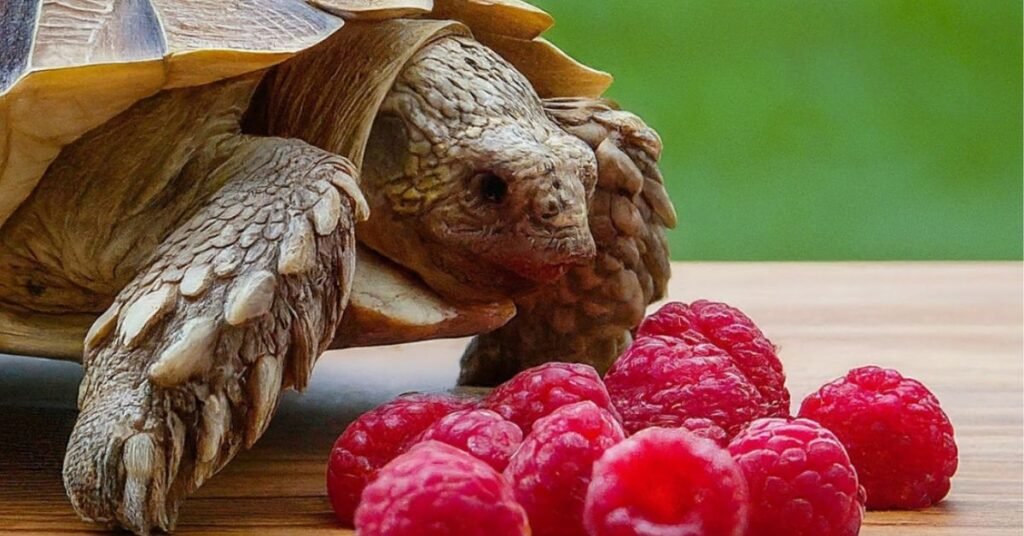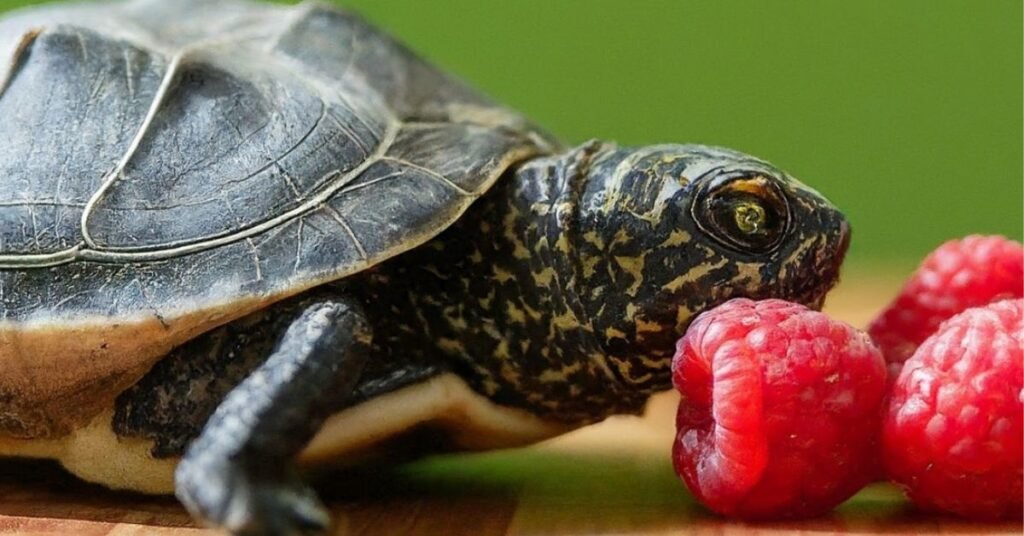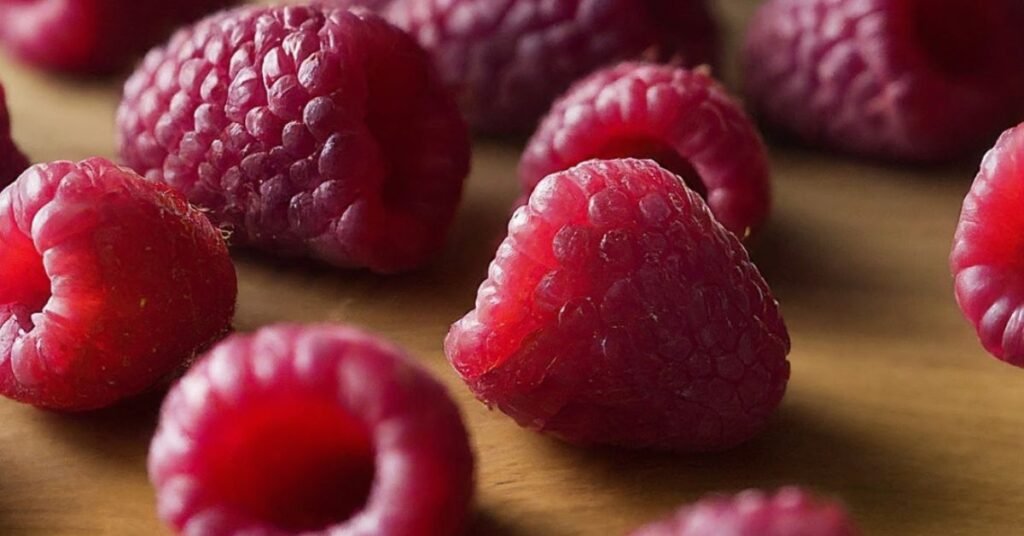Most of the adult turtle species are omnivores. It means they are more likely to eat vegetables, leafy greens, or fruits. But, when it comes to feeding fruits to your turtle, you can only add some of them to their regular diet. If you’re a turtle owner, you might be curious about this type of question: Can Turtles Eat Raspberries?
Raspberries are delicious and packed with nutrients, but are they safe for turtles? The good news is that turtles can eat raspberries but in moderation. A balanced diet is vital for keeping your turtle healthy and happy. So, this article will guide you through this: can turtles eat raspberries? If they can, what are the benefits or the risks of feeding raspberries? We will discuss all of your queries regarding this specific fruit diet.
Table of Contents
Can Turtles Eat Raspberries?

Yes, turtles can raspberries. Raspberries are full of nutrients like vitamin C, fiber, phosphorus, etc. However, you should not include this fruit in your turtle’s regular diet. Most of the fruits are recommended to feed occasionally for turtles’ diet. The main reason behind this is the sweetness. Feeding sweet treats regularly to your turtle is not a good idea, as this can cause several health issues.
Nutritional Table for Raspberries (Per 123 Grams / 1 Cup)
The following is the nutritional table of 1 cup of raspberry contains –
| Nutrient | Amount |
| Calories | 64 kcal |
| Carbohydrates | 14.7 grams |
| Fiber | 8 grams |
| Protein | 1.5 grams |
| Fat | 0.8 grams |
| Vitamin C | 54% of RDI |
| Manganese | 41% of RDI |
| Vitamin K | 12% of RDI |
| Vitamin E | 5% of RDI |
| B Vitamins | 4-6% of RDI |
| Iron | 5% of RDI |
| Magnesium | 7% of RDI |
| Phosphorus | 4% of RDI |
| Potassium | 5% of RDI |
| Copper | 6% of RDI |
Nutritional Benefits of Raspberries for Turtles

Here are some of the nutritional ingredients and their benefits for turtle health –
Vitamin C For Immune System
Vitamin C is critical for maintaining a robust immune system. This vitamin helps protect your turtle from illnesses and repairs tissues. It’s essential to make sure your turtle gets enough Vitamin C to stay active and healthy.
Dietary Fiber For Digestion
Raspberries are rich in dietary fiber, which is crucial to maintaining a healthy digestive system. Fiber helps prevent constipation and promote regular bowel movements. Incorporating raspberries into your turtle’s diet can help ensure smooth digestion. Adding fiber is especially important for species like the Red-Eared Slider.
Antioxidants
Raspberries are high in antioxidants, such as quercetin and ellagic acid. Those compounds help your turtle’s body fight off free radicals and also help to reduce oxidative stress and increase its longevity. Your turtle needs antioxidants for cellular health, so it’ll prevent diseases and stay healthy.
Vitamin K For Bone Health
Vitamin K is essential for bone health. It helps form strong bones and is particularly important for turtles, whose shells and skeletal structure need robust support. Including raspberries in their diet can contribute to healthy bone development and maintenance.
Hydration
Raspberries have a high water content, which helps keep your turtle hydrated. Hydration is essential for turtles since it supports their body functions and prevents dehydration. This is especially important during the warmer months when it may need more water.
Manganese
Manganese is a lesser-known but vital mineral found in raspberries. It aids metabolism and regulates blood sugar levels. This is particularly beneficial for turtles, as it ensures they have enough energy for their daily activities and prevents metabolic disorders.
Raspberries have a small amount of protein, but they could contribute when added to a balanced diet for tissue repair and growth. Not only protein, there are more nutrition ingredients, if you look at the table above.
Are There Any Risks to Feeding Raspberries to Turtles?
Yes, there are risks, but only if you do not serve raspberries in moderation. Otherwise, this fruit is a safe addition to your turtle’s diet. We already mentioned above that you have to feed your turtle fruits like raspberries occasionally. Let’s see for frequent feeding what risks are there :
High Sugar Content
Raspberries, while nutritious, have significant natural sugar. Feeding turtles too many raspberries can lead to problems such as obesity and diabetes. Excessive sugar intake can also cause digestive issues, which can make your shelled friend uncomfortable. For example, a few raspberries once or twice a week as a treat is okay, but making it a daily snack isn’t advisable.
Oxalates and Kidney Problems
Raspberries contain oxalates, which can bind to calcium in a turtle’s diet. This binding inhibits calcium absorption, causing kidney problems and other health problems. Oxalates can contribute to the formation of kidney stones, which are painful and harmful to turtles. To avoid this, ensure raspberries are given sparingly.
Phosphorus Levels and Metabolic Bone Disease
Another consideration is raspberries’ phosphorus content. Turtles require a balanced calcium-to-phosphorus ratio for proper bone health. Raspberries have more phosphorus than calcium, which can disrupt this balance and lead to metabolic bone disease. This disease causes soft or deformed shells and bones. Therefore, it’s crucial to feed raspberries in moderation and ensure your turtle’s diet has adequate calcium.
Species-Specific Dietary Needs
Different turtle species have different dietary requirements and tolerances. For example, some turtles might handle raspberries’ sugar and oxalates better than others. It’s essential to research your turtle species’ specific needs. Box turtles might enjoy a raspberry now and then, but aquatic turtles like red-eared sliders might have different dietary needs.
How Often Can You Serve Raspberries to Turtle?
Whenever you feed your turtle raspberries, make sure to do it in moderation. Fruit, including raspberries, should make up less than 10% of your turtle’s overall diet. The key is to ensure they get a balanced nutritional intake without overloading with sugar.
Raspberries can be given as an occasional treat, ideally once or twice a week. It prevents health problems like obesity and digestive problems caused by too much sugar. It’s also a good practice to mix raspberries with other fruits and vegetables to provide variety and additional nutrients.
How to Prepare Raspberries Before Serving Them to Turtle

You can prepare raspberries so that your turtle can enjoy them safely. Here’s a simple guide to get you started:
- Wash Thoroughly: First, wash the raspberries thoroughly under running water. This step is vital to remove any pesticides or dirt that could harm your turtle.
- Cut or Mash: Cutting or mashing is not a must. Raspberries are already smaller in size; adult turtles can have them as they are. However, to make raspberries easier for your baby turtle to eat, cut them into small bite-sized pieces or mash them up. This is especially helpful for turtles with smaller mouths or those that struggle with larger pieces.
- Remove Seeds: If possible, try to remove any seeds from the raspberries. The tiny seeds can sometimes cause digestive issues or discomfort for turtles. While it may be tedious, this step ensures better safety for your pet.
However, even if you can avoid some of the steps above, you should clean or wash them before serving the turtle.
FAQs
Can Box Turtles Eat Raspberries?
Yes, box turtles can eat raspberries. If served in moderation, these berries can be a healthy addition to their diet. Raspberries, like other fruits, should make up less than 10% of your box turtle’s diet. As a result, they won’t consume too much sugar, which can be harmful.
Can Aquatic Turtles Eat Raspberries?
Certainly, aquatic turtles can eat raspberries as an occasional treat. Raspberries are packed with vitamin C, fiber, and essential antioxidants, which can benefit your turtle. However, they should be given in moderation due to their sugar content.
Can Painted Turtles Eat Raspberries?
Yes, painted turtles can eat raspberries. These berries can be a nutritious and delightful treat for your painted turtle. However, moderation is essential. Raspberries or any other sweet fruit should only be a small part of their diet, ideally less than 10%.
Can Red-Eared Slider Turtles Eat Raspberries?
Absolutely, red-eared slider turtles can eat raspberries. If the fruit is given in moderation, it can be a healthy addition to their diet. Raspberries should be an occasional treat, making up at most 5-10 % of their overall diet.
Read More: Can Turtles Eat Mushrooms?
Bottom Line
Even though turtles can eat raspberries, balance is vital when feeding them to turtles. While they can enjoy the occasional raspberry, it should not be a staple of their diet. A balanced diet rich in vegetables, leafy greens, and proteins is essential for their health. For instance, offering raspberries once or twice a week can be an excellent way to provide variety without overdoing it.
